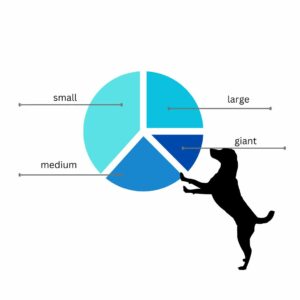As a pet owner or caregiver, dealing with an old dog diarrhea can be frustrating and worrying. However, understanding the causes, symptoms, and treatment options can help you manage the condition effectively and prevent potential complications.
Old Dog Diarrhea: Table of Contents
Common Causes of Diarrhea in Senior Dogs
Diarrhea is a gastrointestinal problem characterized by loose, watery stools.
In older dogs, the condition is often a symptom of an underlying health issue, rather than a standalone condition.
- Food intolerance or allergies
- Bacterial, viral, or parasitic infections
- Inflammatory bowel disease
- Pancreatitis
- Colitis
Types of Diarrhea in older dogs
1. Small bowel
Small bowel diarrhea is usually an acute condition and it includes symptoms:
- diarrhea a couple of times a day
- dog doesn’t seem to be straining
- no increased urge to defecate
- vomiting
- appetite loss leading to weight loss
- darkening of the stool(if there’s blood in diarrhea)
Small bowel diarrhea can be caused by:
- infectious diseases and viral infections (parvovirus)
- imbalance in the intestinal microbiota (Small intestinal dysbiosis). The most common cause of dysbiosis syndrome in dogs is the use of antibiotics, although there are other causes such as corticosteroids, NSAIDS, stress, toxins, and dietary problems. The condition is also known as small intestinal bacterial overgrowth (SIBO), antibiotic-responsive diarrhea, leaky gut syndrome, or tylosin-responsive diarrhea. It can lead to intestinal lining damage and reduced production of short-chain fatty acids and other metabolites and can disrupt the intestinal barrier.
Treatment for small intestinal dysbiosis may include dietary changes, probiotics, and prebiotics, as well as medication such as antibiotics or tylosin. A veterinarian may also recommend diagnostic testing to identify the underlying cause of the dysbiosis. Management of the condition can involve feeding a balanced, high-quality diet, avoiding unnecessary medications, and reducing stress.
- Food-responsive disease in dogs, also known as food-responsive enteropathy (FRE), is a type of chronic enteropathy characterized by chronic, recurrent or persistent gastrointestinal signs. FRE is one of the three major subgroups of chronic enteropathies in dogs, the others being antibiotic-responsive disease (ARD) and steroid-responsive disease (SRD).
Dogs with FRE are typically younger than dogs with SRD and present with signs of large bowel disease. Symptoms of FRE include vomiting, diarrhea, weight loss, flatulence, and abdominal discomfort. FRE is more common in younger dogs, but it can occur at any age.
A diagnosis of FRE can be made by exclusion, which involves ruling out other possible causes of chronic enteropathy. This may include performing blood tests, fecal analysis, and abdominal imaging. A dietary elimination trial is often recommended before endoscopy for dogs with mild or moderate symptoms.
Once diagnosed, FRE can be treated with a therapeutic meal plan, such as a Prescription Diet Dog Food. Different options include easily digestible formulas, novel or hydrolyzed protein formulas, and high-fiber formulas. FRE may require lifelong management through a specific diet and nutritional supplements to maintain optimal health.
- Inflammatory bowel disease (IBD) is a condition that can affect dogs of any age, but it is more common in older dogs. IBD is a syndrome rather than a specific disease, characterized by chronic inflammation of the gastrointestinal tract. The symptoms of IBD in dogs include chronic vomiting, diarrhea, weight loss, and poor appetite.
The causes of IBD in dogs are not fully understood, but it is believed that the condition results from an abnormal immune response to chronic irritation of the intestinal tract. IBD can affect any part of the gastrointestinal tract, including the stomach, small intestine, large intestine, or a combination of these areas.
The continuing inflammation caused by IBD can damage the lining of the digestive tract and prevent proper digestion of food, leading to malnutrition and other health problems. There are various treatment options available for IBD in dogs, including dietary changes, medication, and, in severe cases, surgery.
- Systemic illnesses and cancer
2. Large bowel – Colitis
Large bowel diarrhea is also clarified as acute, but symptoms are somewhat different than in small bowel. Symptoms show as:
- urge to defecate more often
- visible mucus in stool
- rarely: weight loss, vomiting, and loss of appetite
Large bowel diarrhea can be caused by:
- indiscretion,
- ingestion of foreign bodies
- reaction to fatty food, drugs, or toxins
- parasites like whipworms
- bacterial infections
- inflammatory conditions/ inflammatory bowel disease (IBD)
- irritable bowel syndrome from stress
- illness, (liver disease, kidney disease, or Addison’s)
3. small and large bowel
is a combination of both – symptoms and causes.
How Aging Affects a Dog’s Digestive System
Aging affects the digestive system of senior dogs in several ways, making them more susceptible to diarrhea:
- Their ability to absorb and digest nutrients from food reduces. This can lead to malnutrition and weight loss.
- Their intestines become less efficient at absorbing water, which can result in loose stools.
- Some senior dogs develop tumors, polyps, or other growths in the digestive tract, which can cause diarrhea.
- Diarrhea can also be a side effect of medication or a reaction to a change in diet. Therefore, it is important to consult with a veterinarian to determine the underlying cause of the diarrhea and provide proper treatment.
Recognizing the Symptoms of Diarrhea

When your dog is suffering from diarrhea, it can be distressing for you and your pet. It is important to keep a close eye on your dog’s symptoms and seek veterinary care if the diarrhea persists for more than a day or two, or if your dog shows signs of dehydration or other complications.
Physical Signs to Look Out For
The common symptoms of diarrhea include:
- loose, runny, or watery stools that can be difficult to clean up.
- you may also notice that your dog’s stools are bloody or mucousy, which can be a sign of a more serious underlying condition.
- in addition to changes in bowel movements, your dog may experience flatulence and stomach cramps, which can cause discomfort and distress.
Changes in Behavior and Energy Levels
Diarrhea can also affect your dog’s behavior and energy levels. Your dog may become lethargic and fatigued, which can be a sign of dehydration or other complications.
Loss of appetite is another common symptom of diarrhea, as your dog may feel nauseous or uncomfortable. In some cases, your dog may vomit, which can further deplete its fluids and electrolytes.
Dehydration is a serious complication of diarrhea that can occur if your dog is not drinking enough water or loses too much fluid through diarrhea and vomiting.
You can check for dehydration by gently pulling up on the skin on the back of your dog’s neck. If the skin stays tented or does not quickly return to its normal position, your dog may be dehydrated and in need of veterinary care.
When to Consult a Veterinarian
While some cases of diarrhea may resolve on their own, others require veterinary attention. Consult a veterinarian if your senior dog exhibits any of the following red flags and warning signs:
- Persistent diarrhea that lasts for more than 24 hours
- Bloody or black stools
- Severe abdominal pain or discomfort
- Fever over 103 F
- Apparent weakness or loss of consciousness
Common health issues that cause diarrhea in older dogs
Chronic diarrhea could be a sign of an underlying health issue such as:
- liver,
- kidney,
- heart disease,
- tumors,
- endocrine problems,
- exocrine pancreatic insufficiency,
- inflammatory bowel disease
Dietary Adjustments for Diarrhea Relief
Feeding a Balanced and Age-Appropriate Diet
Feeding your senior dog a bland diet of boiled chicken and rice or a prescription diet with low-fat and high-fiber content can help manage diarrhea. Bland diets are easy to digest and can help soothe an upset stomach.
You can also add some pumpkin or sweet potato to your dog’s diet, as these are rich in fiber and can help regulate bowel movements.
When selecting food for your senior dog, choose easily digestible food that is free from allergens or irritants that can cause diarrhea. Senior dogs may require food that is higher in fiber to aid in digestion and prevent constipation.
Avoid feeding your dog high-fat or spicy foods, dairy products, and human leftovers, as these can worsen the condition. Avoid sudden dietary changes, as this can cause digestive upset and diarrhea.
Hydration and Electrolyte Replacement
Ensure your senior dog drinks plenty of water or electrolyte replacement fluids to prevent dehydration.
Dehydration can be a severe complication of diarrhea and can lead to other health problems.
Offer small, frequent amounts of water or broth, and encourage your dog to drink regularly. You can add some low-sodium chicken or beef broth to your dog’s water to make it more appealing.
If your senior dog is not drinking enough water, you can use a syringe or eye dropper to administer water or electrolyte replacement fluids. Alternatively, you can offer your dog ice cubes made from low-sodium broth or water to encourage them to drink.
Vet Q&A
Q: What are the common causes of diarrhea in older dogs?
A: The most common causes of diarrhea in older dogs include infectious diseases, viral infections, small intestinal dysbiosis, food-responsive disease, and allergies to new foods or medications.
Q: How can I help my old dog with diarrhea?
A: You can help your dog by withholding food for 12 to 24 hours and providing water in small amounts frequently to allow the gastrointestinal tract to settle. Probiotics can also be helpful in supporting a healthy immune system by keeping the intestinal bacteria in good balance and aiding in digestion.
Q: What is chronic diarrhea in dogs?
A: Chronic diarrhea occurs when dogs don’t respond to common treatments for diarrhea, or when they do respond to treatment initially, but the diarrhea continues to return. Diarrhea is considered chronic when it lasts more than two weeks.
My Senior Paws is a participant in the Amazon Services LLC Associates Program, an affiliate advertising program designed to provide a means for sites to earn advertising fees by advertising and linking to Amazon.com. We also participate in other affiliate programs which compensate us for referring traffic.




